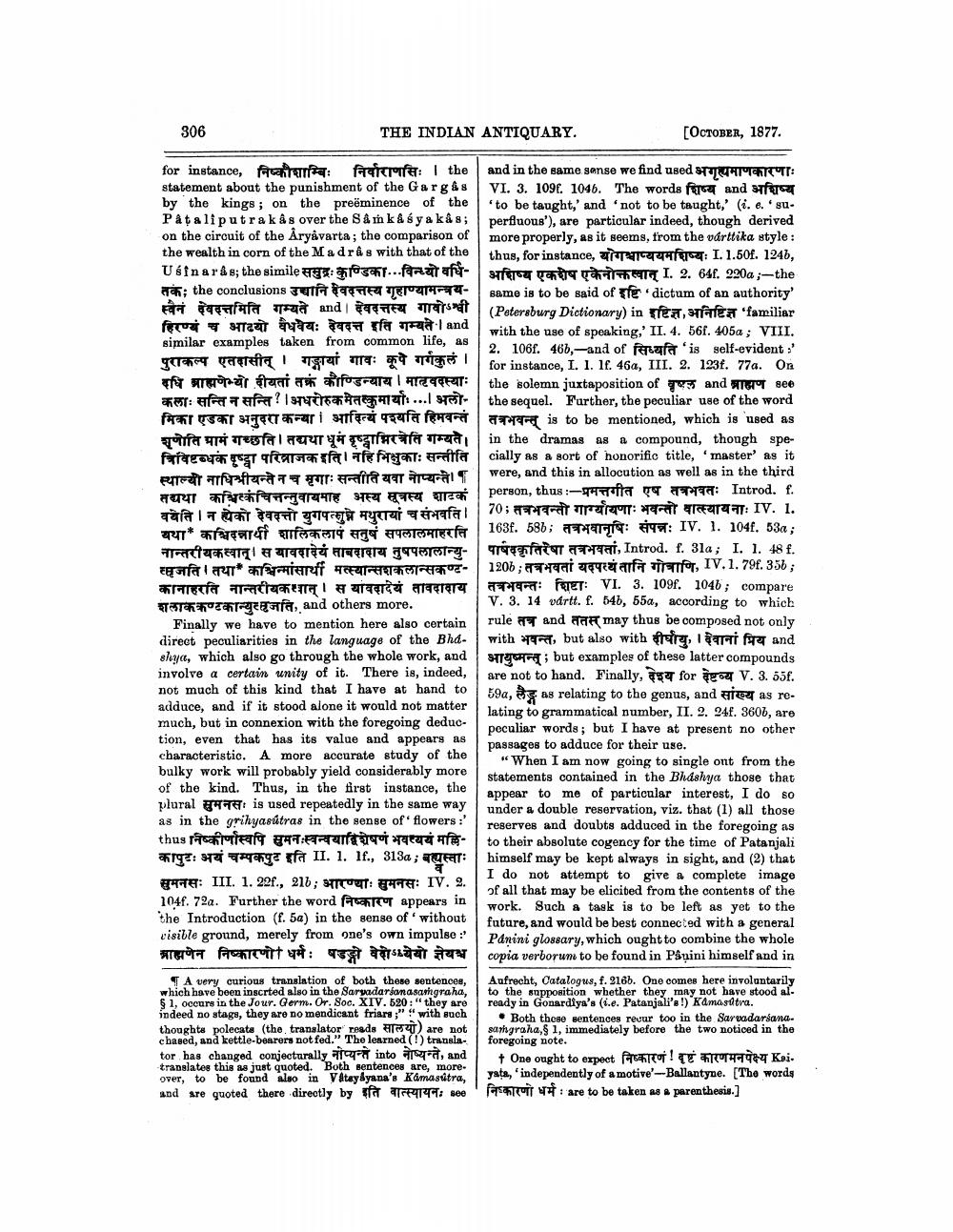________________
306
THE INDIAN ANTIQUARY.
[OCTOBER, 1877.
for instance, निष्कौशाम्बिः निराणसिः I the | and in the same sense we find used अगह्यमाणकारणाः statement about the punishment of the Gargas | VI. 3. 1096. 1046. The words शिष्य and अशिष्य by the kings; on the preëminence of the 'to be taught,' and 'not to be taught,' (i.e. 'su. Pata liputra kås over the Samk& sya kas; perfluous'), are particular indeed, though derived on the circuit of the Aryavarta; the comparison of more properly, as it seems, from the vdrttika style: the wealth in corn of the Madras with that of the
thus, for instance, योगश्चाप्ययमशिष्यः I. 1.50f. 124b, Usinaris; the simile समुद्रः कुण्डिका...विन्यो वधि- अशिष्य एकशेष एकेनोक्तत्वात् I. 2.64f. 220a;-the तक; the conclusions उच्चानि देवदत्तस्य गृहाण्यामन्त्रय- same is to be said of fe dictum of an authority' स्वैनं देवदत्तमिति गम्यते and | देवदत्तस्य गावोऽश्वी
| (Petersburg Dictionary) in इष्टिज्ञ,अनिष्टिज्ञ familiar हिरण्यं च आढयो वैधवेयः देवदत्त इति गम्यते| and
with the use of speaking,' II. 4. 56f. 405a; VIII. similar examples taken from common life, as
| 2. 106f. 46b,-and of सिध्यति 'is self-evident: पुराकल्प एतदासीत् । गङ्गायां गावः कूपे गर्गकुलं ।
for instance, I. I. If. 46a, III. 2. 1231.77a. On दधि ब्राह्मणेभ्यो दीयतां तक्रं कौण्डिन्याय । माटवदस्याः the solemn juxtaposition of वृषल and ब्राह्मण 80 कलाः सन्ति न सन्ति ।अधरोरुकमेतस्कुमार्याः ...। अलो- the sequel. Further, the peculiar use of the word मिका एडका अनुदरा कन्या। आदित्यं पश्यति हिमवन्त | तत्रभवन्तु is to be mentioned, which is used as शणोति ग्रामं गच्छति। तद्यथा धूम दृष्ट्राभिरति गम्यते। in the dramas as a compound, though speत्रिविष्टब्धक पृष्टा परिव्राजकइति । नहि भिक्षुकाः सन्तीति | cially as a sort of honorific title, 'master' as it स्थाल्यो नाधिश्रीयन्तेन च मृगाः सन्तीति यवा नोप्यन्ते। were, and this in allocution as well as in the third सबथा कश्चित्कंचिचन्नुवायमाह भस्य सूत्रस्य शाटकं person, thus:-प्रमत्तगात एष तत्रभवतः Introd. f. बोनिनको देवलो यापकाचे महासंभवति।। 70% तत्रभवन्ती गाग्योयणाः भवन्तो वात्स्यायनाः IV. 1. यथा* कश्चिदन्नार्थी शालिकलापं सतुषं सपलालमाहरति
| 163f. 58b; तत्रभवानृषिः संपन्नः IV. 1. 104f. 53a; नान्तरीयकत्वात् । स यावदादेयं तावदादाय तुषपलालान्यु- | पार्षदकृतिरेषा तत्रभवतां, Introd. f. 31a; I. 1.48f. स्मृजति तथा कश्चिन्मांसाथी मत्स्यान्सशकलान्सकण्ट
12063 तत्रभवतां यदपत्यंतानि गोत्राणि, IV.1.79f. 350%; कानाहरति नान्तरीयकचात् । स यावदादेयं तावदादाय
तत्रभवन्तः शिष्टाः VI. 3. 109f. 1046; compare शलाककण्टकान्युरसृजति, and others more.
V. 3. 14 vartt. f. 545, 55a, according to which Finally we have to mention here also certain
rule तत्र and ततस् may thus be composed not only direct peculiarities in the language of the Bha- with भवन्त, but also with दीर्घायु, । देवानां प्रिय and shya, which also go through the whole work, and आयुष्मन्त्; but examples of these latter compounds involve a certain unity of it. There is, indeed, are not to hand. Finally, देश्य for देष्टव्य V. 3.55f. not much of this kind that I have at hand to
59a, e as relating to the genus, and it as readduce, and if it stood alone it would not matter
lating to grammatical number, II. 2. 24f. 3606, are much, but in connexion with the foregoing deduc.
peculiar words; but I have at present no other tion, even that has its value and appears as
passages to adduce for their use. characteristic. A more accurate study of the
"When I am now going to single ont from the bulky work will probably yield considerably more
statements contained in the Bhashya those that of the kind. Thus, in the first instance, the
appear to me of particular interest, I do so plural T TE: is used repeatedly in the same way
under a double reservation, viz. that (1) all those as in the grihyasútras in the sense of flowers :'
reserves and doubts adduced in the foregoing as thusनिष्कीणोस्वपि सुमनःस्वन्वयाद्विश्रेषणं भवत्ययं मल्लि- to their absolute cogency for the time of Patanjali कापुटः अयं चम्पकपुट इति II. 1. If., 313a; बह्यस्ताः himself may be kept always in sight, and (2) that सुमनसः III. 1. 22f., 216; आरण्याः सुमनसः IV.2.
I do not attempt to give a complete image
of all that may be elicited from the contents of the 104f.72a. Further the word निष्कारण appears in
work. Such a task is to be left as yet to the the Introduction (f. 5a) in the sense of' without
future, and would be best connected with a general visible ground, merely from one's own impulse :
Panini glossary, which ought to combine the whole ब्राह्मणेन निष्कारणो धर्मः षडङ्गो वेदोऽध्येयो ज्ञेयश्च
copia verborums to be found in Panini himself and in
TA very curious translation of both these sentences, Aufrecht, Catalogus, f. 216b. One comes here involontarily which have been inscrted also in the Sarwadarsonasangraha, to the supposition whether they may not have stood al$ 1, occurs in the Jour. Germ. Or. Soc. XIV. 520:"they are
ready in Gonardiya's (i.e. Patanjali's!) Kamasutra. indeed no stage, they are no mendicant friars;" with such
Both these sentences revur too in the Sarvadarsana. thoughts polecata (the translator reads T) are not sangraha, 1, immediately before the two noticed in the chased, and kettle-bearers not fed." The learned (!) transla- foregoing note. tor has changed conjecturally नोप्यन्ते into नोष्यन्ते, and
+ One ought to expect निष्कारणं! दृष्टं कारणमनपेक्ष्य Kai. translates this as just quoted. Both sentences are, more. over, to be found also in Vatayayana's Kamasutra, and are quoted there directly by इति वात्स्यायन: 100 ' निष्कारणो धर्म: are to be taken as a parenthesis.]




